Behringer A500 Intermittent Input Loss? Here's A Fix!
Pedantic Background Info
This has been a problem which has bugged me for nearly a decade. I am amazed that I did not just buy different amps at some point lol. Anyway, I have three Behringer A500 amplifiers in the house, and at various points two of them would lose the left channel's input signal (one amp did it, then I moved it to the garage where it has worked fine, and then later on its replacement did the same thing). It was most common after a "cold start" and wiggling the input plug would usually fix it. When wiggling the plug I could hear the left output come on and go off again, and sometimes it would be on but at a very low volume.
Back when these were under warranty, I sent the first one in for repair, but the tech could not find anything wrong with it. Annoyingly, any time I took the amp out of the rack to inspect it, it would work just fine for some months before having the issue again. So naturally, taking it to the tech caused it to work! I think that this was in 2011.
Years later after buying a house and switching from a tri-amped system, to a bi-amped one (Zaph ZRT + subsonic subwoofer), the wonky amp got put into the garage to drive an older pair of T-M speakers that I had built. It just used the RCA inputs since it was fed from my laptop and phone and stuff, and it has had zero issues ever since. However, one of the ones in the living room started losing the left input abut a year ago. All of the "indoor" amps were always used with balanced inputs, and I had tried both XLR and TRS to try to deal with the input loss to no avail. Both would lose the signal, and vigorous wiggling (lol) could bring it back after a while. Once the signal was back on and the amp had warmed up for 15+ minutes, it would stay on.
I could find no electrical faults or bad solder joints on either amp. The fact that mechanical stimulus would "fix" the issue was baffling, and I assumed it was bad electrolytic coupling caps that needed to heat up / expand and get jostled a little to deal with some sort of internal open circuit at a terminal. Then, tonight, I did another web search for this issue, since I had seen a large number of A500 users on various audio forums complaining about input loss on one or both channels over the last decade.
And, what do you know, a solution had in fact been found. I cannot take credit for root-causing this one, but I did at least photo document it a bit. My "solution" is overkill, but since I will never use the unbalanced RCA inputs on the two A500 amps that I have now modified, it is fine for me.
OK, A Solution Already
The guy who found the cause:
Repairing Behringer A500 amp - 2 Channel - HiFi WigWam
It perfectly explains the behavior I have been dealing with, and why wiggling the inputs fixes the issue. I guess that the little contact which jumps the output of the balanced input buffer to the main input corrodes/oxidizes, or is just manufactured with too weak of a bend to make good contact.
If you look at the A500 schematic for the inputs, you will see what I circled in red. The schematic is not super clear about what this is, but it is actually a normally-closed switch. When you insert an RCA plug, the signal prong displaces the central tab, breaking contact with the rear plate which carries the signal from the balanced inputs.
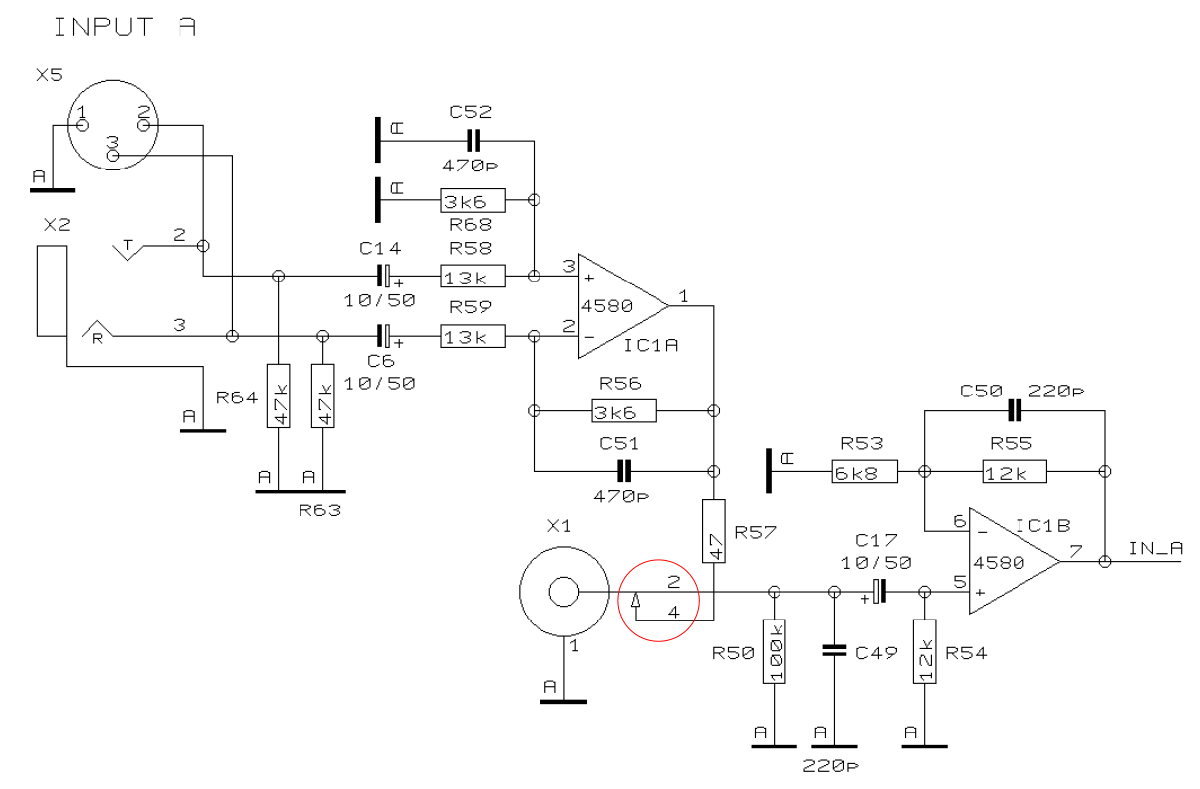
Here is the actual connector part. When the RCA prong goes in, it depresses that middle tongue. The rear-most contact which goes down to the left solder tab is what has the balanced input signal, and it loses contact with the middle tongue. What seems to be happening is that the middle tongue makes poor contact with the rear contact under no-RCA conditions. Wiggling the other inputs and/or moving the whole unit seems to generate enough disturbance to regain contact, and I assume that as thermal expansion occurs, it eventually makes contact again for the duration of the use session.
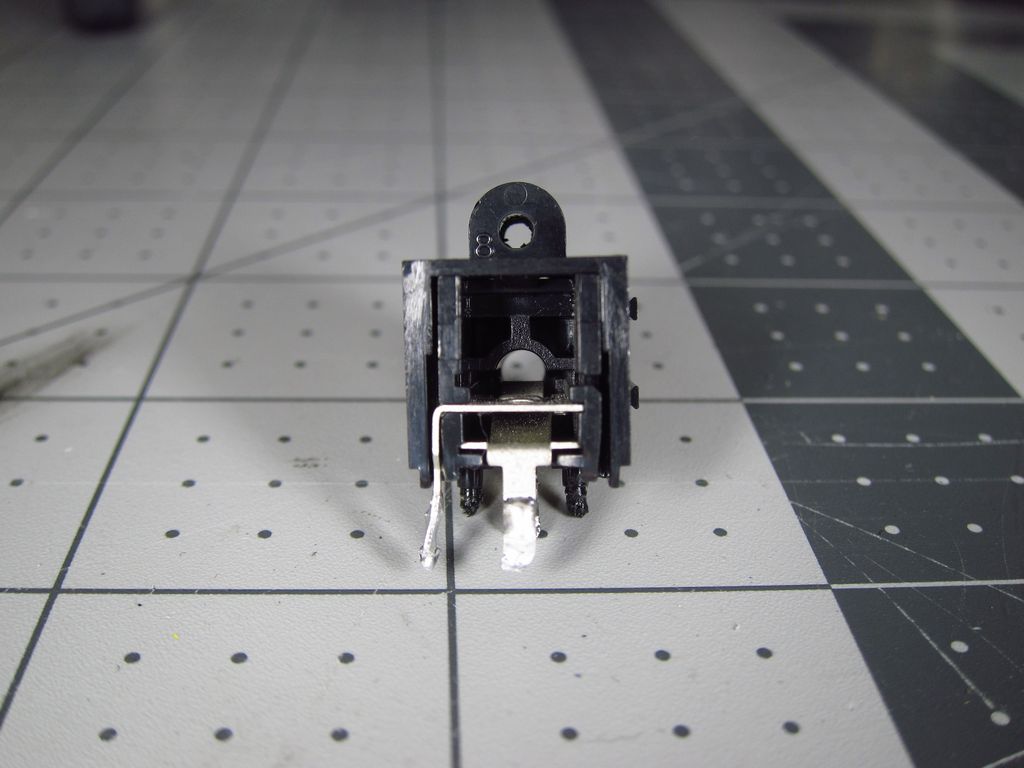
My fix involved some basic hobbyist tools:
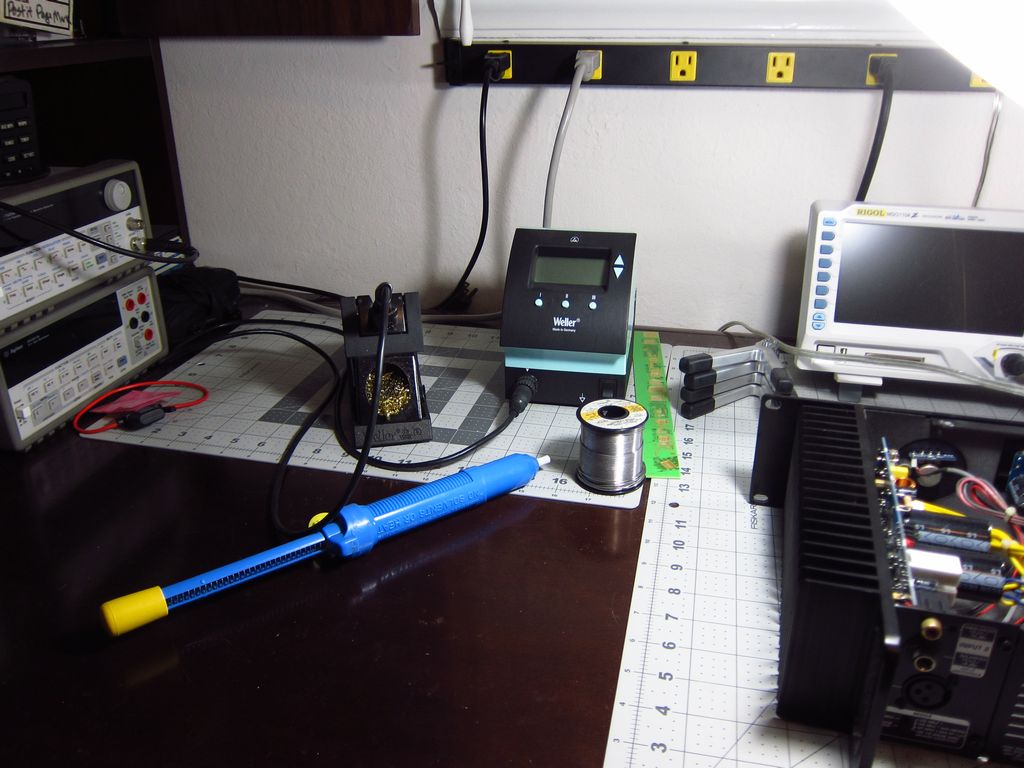
A view of the culprit. No need to take the amp too far apart.
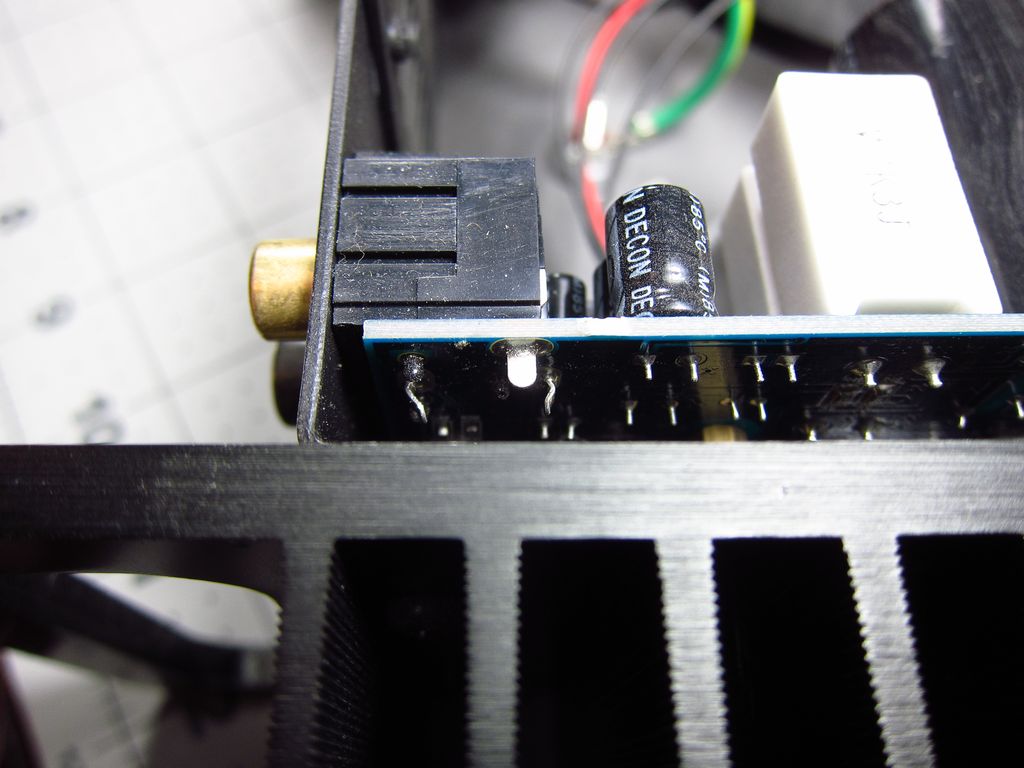
You just need to take the little cover plate off which shrouds the inputs.
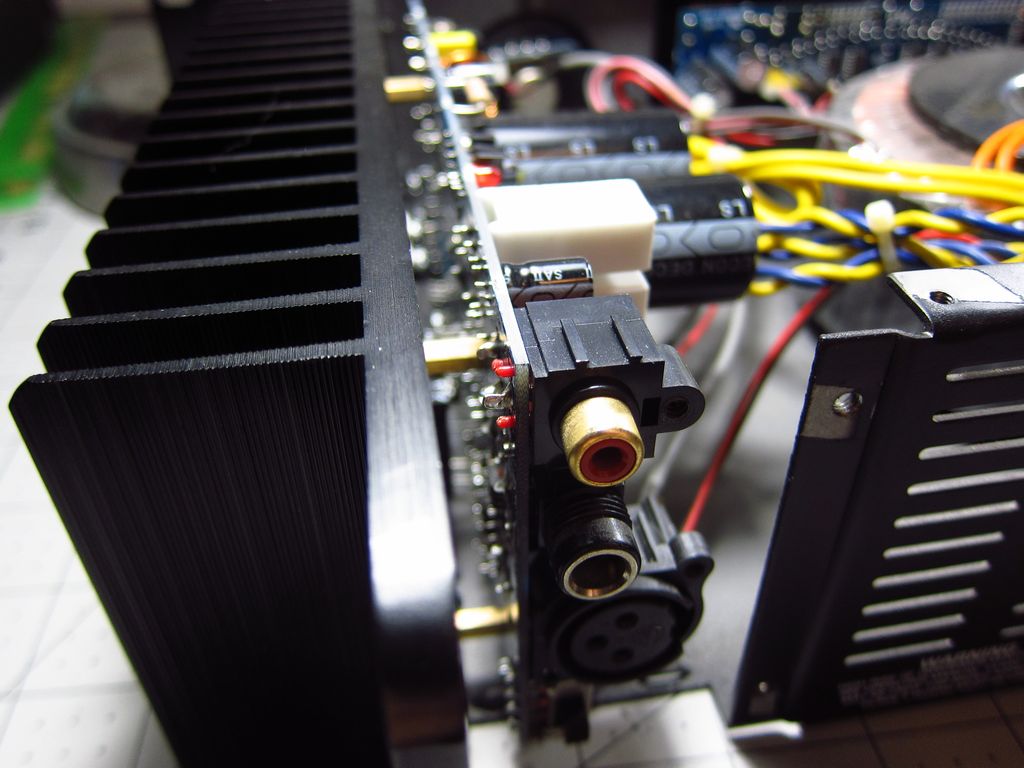
It takes all of a minute to remove the RCA receptacle. Just apply a little leaded solder (to help the lead-free stuff to flow) to the 3 terminals, and then heat each one while pulling that corner of the receptacle body. Do it in small steps, rotating around the terminals, until the thing is free. You do not want to rip a pad off since 2 of the 3 electrical connections are still required to be working.
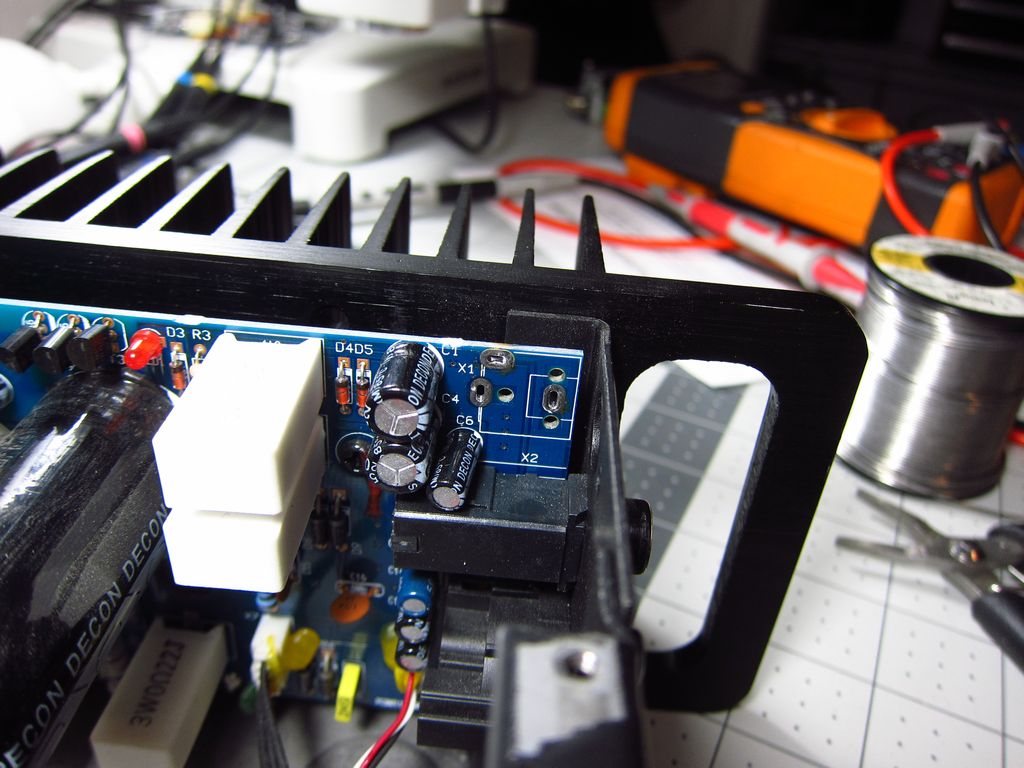
As you saw in the schematic, the RCA receptacle acts as a jumper for the balanced input signal. With it gone, you will need to make your own.
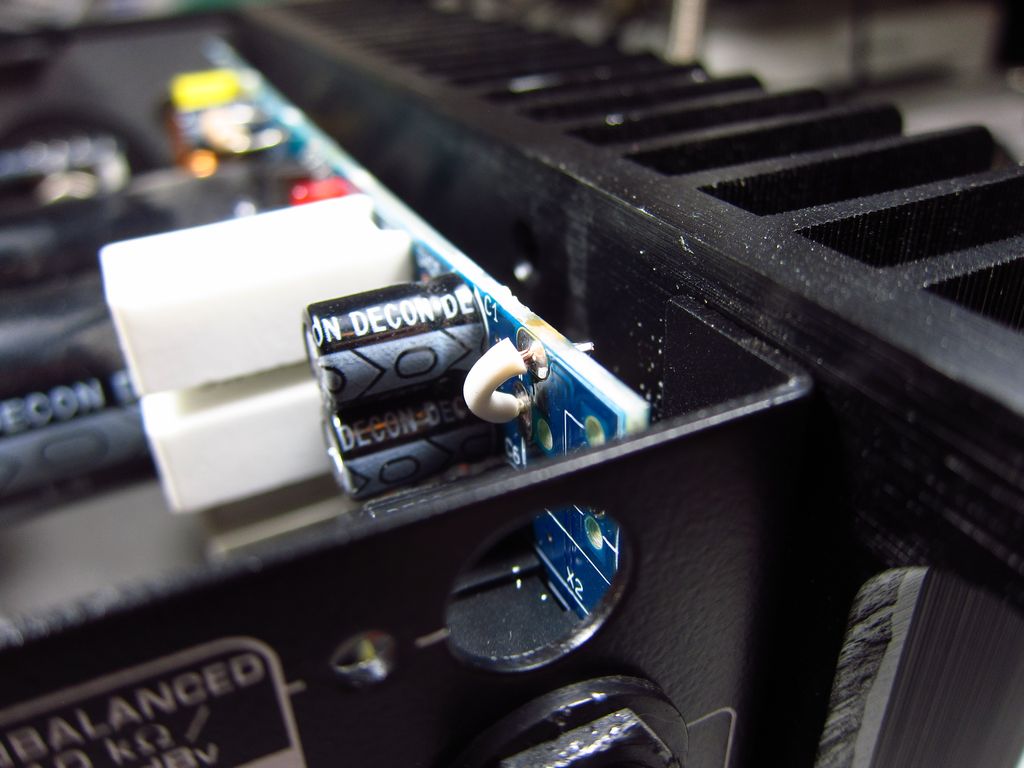
Good riddance! While it was only one of the inputs which had the issue, I decided to not risk leaving them in either of the "indoor" amps since sometimes the output still works, but weaker to varying degrees. I don't want to have to wonder if my amps are having a partial problem. The third A500, in the garage, uses the RCA inputs as it is, so it cannot have this problem by definition, and I sort of need to leave the receptacles intact!
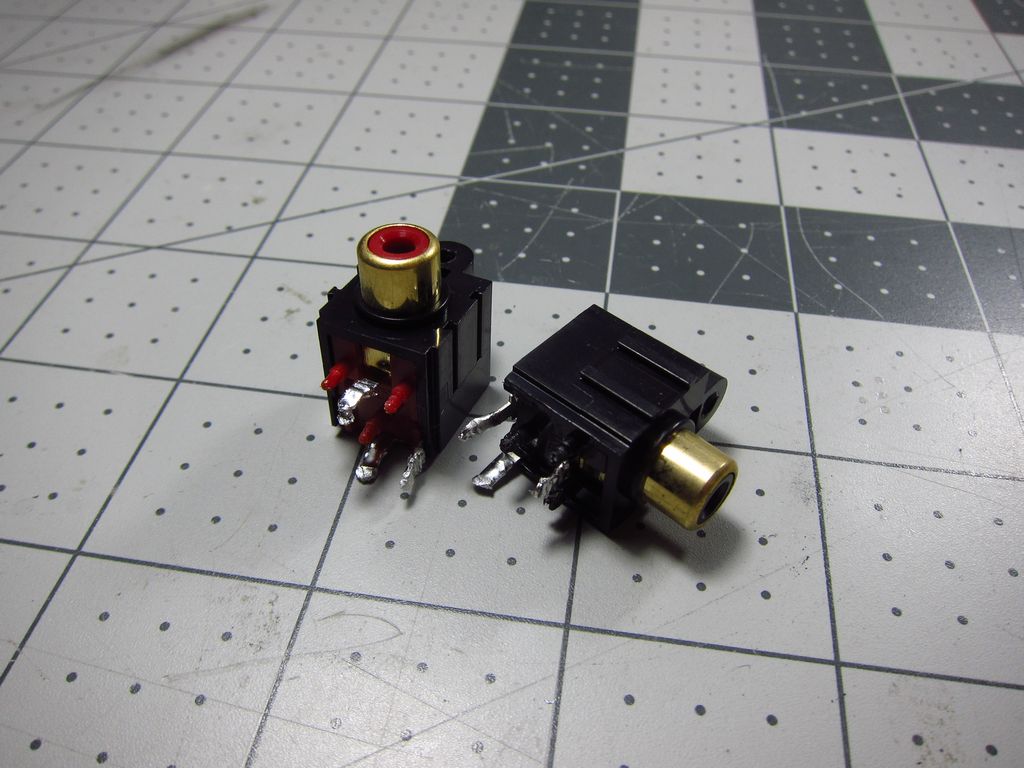
So, there it is. I do not know how many people still use the A500 amplifier, and of them how many may be having issues with input loss. But, if you are faced with this issue, hopefully this thread will come up in searches of the web and this forum!
Search keywords:
Behringer, A500, amplifier, input, loss, intermittent, contact, problem, broken, output, fade, weak, fix, repair, solution
Pedantic Background Info
This has been a problem which has bugged me for nearly a decade. I am amazed that I did not just buy different amps at some point lol. Anyway, I have three Behringer A500 amplifiers in the house, and at various points two of them would lose the left channel's input signal (one amp did it, then I moved it to the garage where it has worked fine, and then later on its replacement did the same thing). It was most common after a "cold start" and wiggling the input plug would usually fix it. When wiggling the plug I could hear the left output come on and go off again, and sometimes it would be on but at a very low volume.
Back when these were under warranty, I sent the first one in for repair, but the tech could not find anything wrong with it. Annoyingly, any time I took the amp out of the rack to inspect it, it would work just fine for some months before having the issue again. So naturally, taking it to the tech caused it to work! I think that this was in 2011.
Years later after buying a house and switching from a tri-amped system, to a bi-amped one (Zaph ZRT + subsonic subwoofer), the wonky amp got put into the garage to drive an older pair of T-M speakers that I had built. It just used the RCA inputs since it was fed from my laptop and phone and stuff, and it has had zero issues ever since. However, one of the ones in the living room started losing the left input abut a year ago. All of the "indoor" amps were always used with balanced inputs, and I had tried both XLR and TRS to try to deal with the input loss to no avail. Both would lose the signal, and vigorous wiggling (lol) could bring it back after a while. Once the signal was back on and the amp had warmed up for 15+ minutes, it would stay on.
I could find no electrical faults or bad solder joints on either amp. The fact that mechanical stimulus would "fix" the issue was baffling, and I assumed it was bad electrolytic coupling caps that needed to heat up / expand and get jostled a little to deal with some sort of internal open circuit at a terminal. Then, tonight, I did another web search for this issue, since I had seen a large number of A500 users on various audio forums complaining about input loss on one or both channels over the last decade.
And, what do you know, a solution had in fact been found. I cannot take credit for root-causing this one, but I did at least photo document it a bit. My "solution" is overkill, but since I will never use the unbalanced RCA inputs on the two A500 amps that I have now modified, it is fine for me.
OK, A Solution Already
The guy who found the cause:
Repairing Behringer A500 amp - 2 Channel - HiFi WigWam
It perfectly explains the behavior I have been dealing with, and why wiggling the inputs fixes the issue. I guess that the little contact which jumps the output of the balanced input buffer to the main input corrodes/oxidizes, or is just manufactured with too weak of a bend to make good contact.
If you look at the A500 schematic for the inputs, you will see what I circled in red. The schematic is not super clear about what this is, but it is actually a normally-closed switch. When you insert an RCA plug, the signal prong displaces the central tab, breaking contact with the rear plate which carries the signal from the balanced inputs.

Here is the actual connector part. When the RCA prong goes in, it depresses that middle tongue. The rear-most contact which goes down to the left solder tab is what has the balanced input signal, and it loses contact with the middle tongue. What seems to be happening is that the middle tongue makes poor contact with the rear contact under no-RCA conditions. Wiggling the other inputs and/or moving the whole unit seems to generate enough disturbance to regain contact, and I assume that as thermal expansion occurs, it eventually makes contact again for the duration of the use session.

My fix involved some basic hobbyist tools:

A view of the culprit. No need to take the amp too far apart.

You just need to take the little cover plate off which shrouds the inputs.

It takes all of a minute to remove the RCA receptacle. Just apply a little leaded solder (to help the lead-free stuff to flow) to the 3 terminals, and then heat each one while pulling that corner of the receptacle body. Do it in small steps, rotating around the terminals, until the thing is free. You do not want to rip a pad off since 2 of the 3 electrical connections are still required to be working.

As you saw in the schematic, the RCA receptacle acts as a jumper for the balanced input signal. With it gone, you will need to make your own.

Good riddance! While it was only one of the inputs which had the issue, I decided to not risk leaving them in either of the "indoor" amps since sometimes the output still works, but weaker to varying degrees. I don't want to have to wonder if my amps are having a partial problem. The third A500, in the garage, uses the RCA inputs as it is, so it cannot have this problem by definition, and I sort of need to leave the receptacles intact!

So, there it is. I do not know how many people still use the A500 amplifier, and of them how many may be having issues with input loss. But, if you are faced with this issue, hopefully this thread will come up in searches of the web and this forum!
Search keywords:
Behringer, A500, amplifier, input, loss, intermittent, contact, problem, broken, output, fade, weak, fix, repair, solution
Last edited:
It is far easier, to use the contacts from time to time by plugging and unplugging the connector, once or twice every six months or when you remember to do it.
It does not need to be powered up at the time as you are merely allowing the contacts to disperse the oxidisation, which is caused by lack of use and atmospherics.
This is especially a problem with jack sockets that are used for insert leads.
It does not need to be powered up at the time as you are merely allowing the contacts to disperse the oxidisation, which is caused by lack of use and atmospherics.
This is especially a problem with jack sockets that are used for insert leads.
Correct! This is overkill. For me, the biggest nuisance is the fact that the input does not fail in a strictly binary fashion, but rather it will at times just attenuate the balanced input. I do not want the headache of always wondering if the left channel is off by a couple of deciBels or something. This takes the guesswork out of it and I will never need to worry about it again.
There are a few valid ways to deal with this. Perhaps I should rename the thread from "the fix" to "a fix". This issue only affects people using the balanced inputs, so maintaining the RCA input functionality seems like it is not all that important. But, I suppose this hurts the possible value if someone wanted to sell it on the used market.
- Status
- This old topic is closed. If you want to reopen this topic, contact a moderator using the "Report Post" button.
- Home
- Live Sound
- PA Systems
- Behringer A500 Intermittent Input Loss? Here's The Fix!
